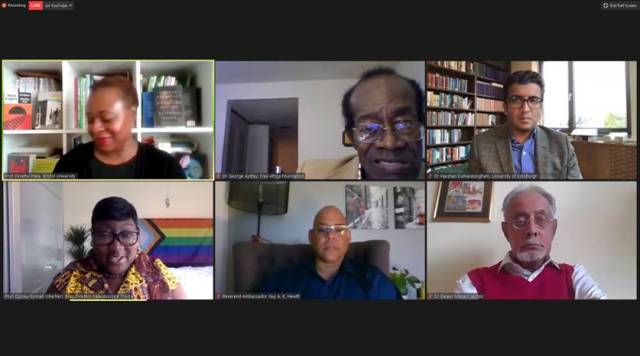 (clockwise l-r) Panel Chair Professor Olivette Otele, Dr George Ayittey, Dr Harshan Kumarasingham, Dr Zareer Masani, Ambassador Guy Hewitt, Phyll Opoku-Gyimah.
(clockwise l-r) Panel Chair Professor Olivette Otele, Dr George Ayittey, Dr Harshan Kumarasingham, Dr Zareer Masani, Ambassador Guy Hewitt, Phyll Opoku-Gyimah.
Learning from the past to build a better future Commonwealth became the thread of discussion at the first Commonwealth Foundation Critical Conversations series. The inaugural event, entitled A Commonwealth for All: Acknowledging the Past – Reimagining the Future set off to tackle a much-debated 2020 topic – the Commonwealth and its imperial past. The 20 October event clearly tapped into the zeitgeist; organisers said that thousands had signed up and logged in for the Zoom session from 55 countries.
Participants tackled issues stemming from the Commonwealth’s and Britain’s past – ranging from the Windrush scandal to democracy in modern-day Africa. Former Barbados High Commissioner to London, Guy Hewitt, described how the Windrush scandal had been rooted in an “institutional racism” which had denied the Windrush generation of their right to remain in the UK by violating the UK’s own rules of justice. He described as “disappointing” the silence from the Commonwealth Secretariat and the Queen as the scandal grabbed the headlines ahead of the Commonwealth Heads of Government April 2018 Meeting in London.
Dr George Ayittey of the Free Africa Foundation said that “true freedom never came to modern Africa” after independence, as the continent traded one set of colonialists for another. He criticised Black African leaders for not introducing democracy to Africa and instead putting one-party socialist states in power.
Dealing with the modern reaction to Britain’s colonial legacy, Dr Harshan Kumarasingham of the University of Edinburgh, said that more students needed to learn about decolonialisation and the economy of colonialism. He criticised the news just coming to light at the time about the University of London’s plans to close its Institute of Commonwealth Studies. He described it as a “great disservice” at a time when the Black Lives Matter (BLM) movement had caused many to start exploring these issues. Dr Kumarasingham said that there had been “a lot of rhetoric and passion…but there needs to be some careful study” on the issue of decolonialisation.
Reimagining the future
Following the opening statements, participants were encouraged to look at the challenges ahead and how the lessons of the past could help the Commonwealth become fit for purpose in a post-COVID/ BLM world.
Bombay-based author and historian, Dr Zareer Masani, described the empire as the “default mode” of running the world until the 20th century. He urged the panel and audience to look at what he called the “new forms of colonialism”. He spoke about the growth of future super powers, issues of citizenship, gay rights and modern-day slavery.
While the panellists did not agree on the legacy of empire, colonialism and the issue of reparations, they did agree on the potential role of the Commonwealth as a future force for good – that is, with some work on its rebranding.
Guy Hewitt said that the “Commonwealth brand is no longer well known” and had “fallen off our regional and international agenda”. He suggested the organisation move from being less of a “talking down organisation” to focus more on bringing groups together. Ambassador Hewitt referred to the need to step away from “the shadow of Empire” to become a shared association. He added that the coronavirus pandemic lessons of connectivity should be helpful.
Dr Ayittey called for the Commonwealth to stop being blind to recent atrocities conducted by some of its leaders and hold all members to “one particular standard”. He also suggested work towards what he called a “Commonwealth of goods and services”.
No longer “London-centric”
Edinburgh University’s Dr Kumarasingham pointed to the need for more scholarship opportunities across parts of the Commonwealth at a time when such schemes are being defunded. He suggested ways to give the modern Commonwealth “resonance” and “capture”, including a Commonwealth version of the Fulbright Scholarships. His suggestions included the need to work on soft power issues such as technical assistance and cultural exchanges in an organisation which did not need to have Britain at the centre of all Commonwealth developments. He said that the Commonwealth brand needed to be more youthful and relevant and also “not moored to a London-centric view”.
During the Q&A sessions, all agreed on the growing need for the Commonwealth be more robust on the issue of human rights. Panellist Phyll Opoku-Gyimah, the Executive Director of the Kaleidoscope Trust, said that funding had moved from tackling human rights and supporting LGBT and black communities to Covid-related causes. Opoku-Gyimah said that the Black Lives Matter movement allowed an organisation like the Commonwealth to make a new future from a shared past, without holding the past as a template. Opoku-Gyimah called on the Commonwealth to ask hard questions about inequalities and vulnerabilities on the ground and support grassroots organisations, while also listening to the historians and academics, adding that “if it’s not about the people, then what are we for?” In answer to one question, Opoku-Gyimah said that it was fine to trade with China once that country did not then “behave like another colonial power in Africa”.
Dr Zareer Masani suggested Commonwealth support for training people in democracy and human rights. He called for more action “from the bottom upwards”.
“The Commonwealth needs a bit more muscular stand towards countries violating human rights,” Dr Ayitti said, pointing to past dealing s with Nigeria’s Sani Abacha and with Zimbabwe. He added: “The Commonwealth should be about the people, not about the leaders.”
A Commonwealth for All: Acknowledging the Past – Reimagining the Future is now available on YouTube.



